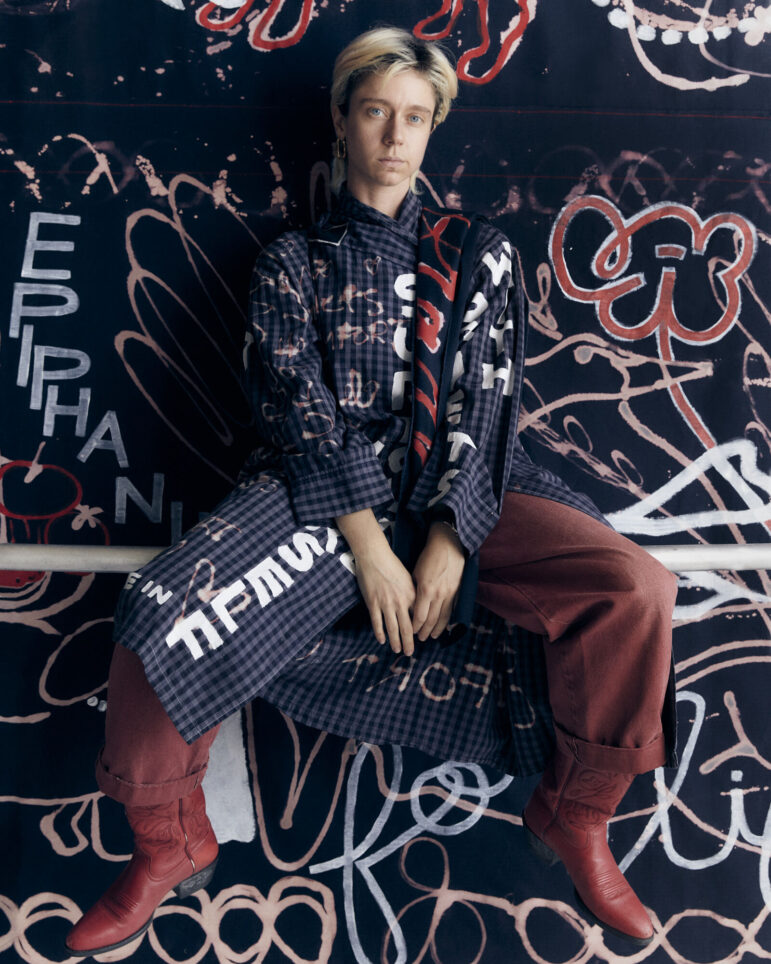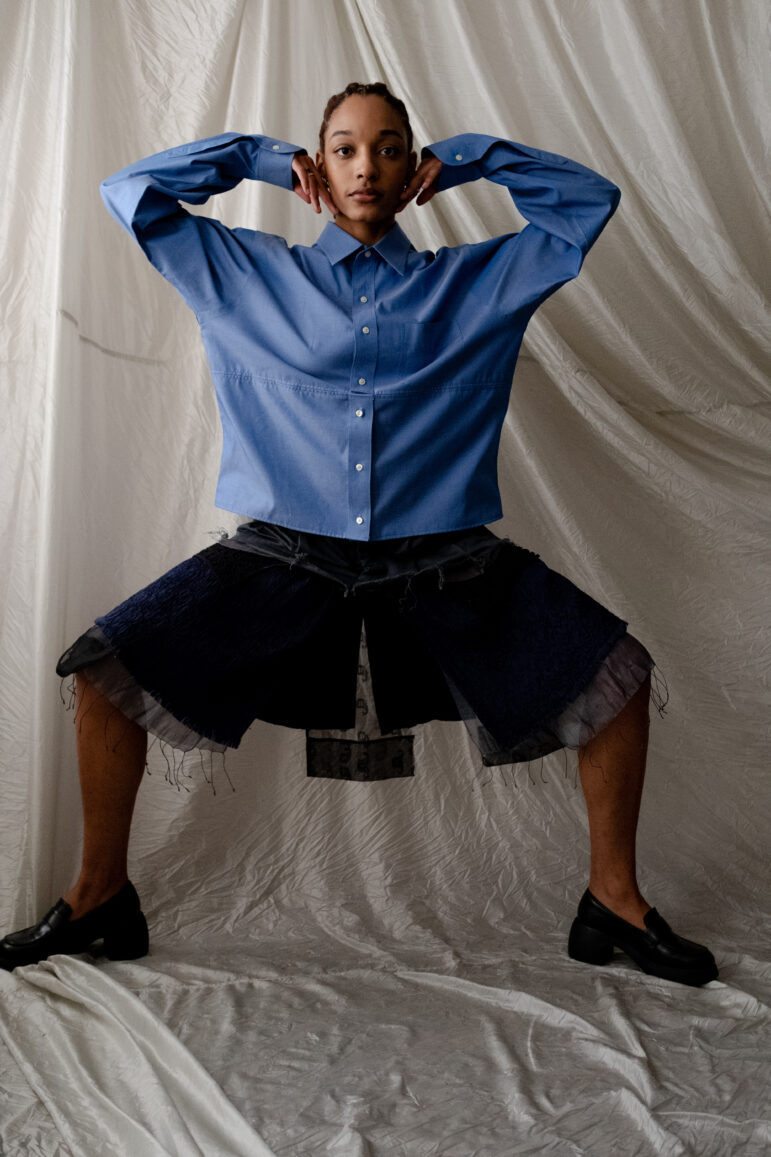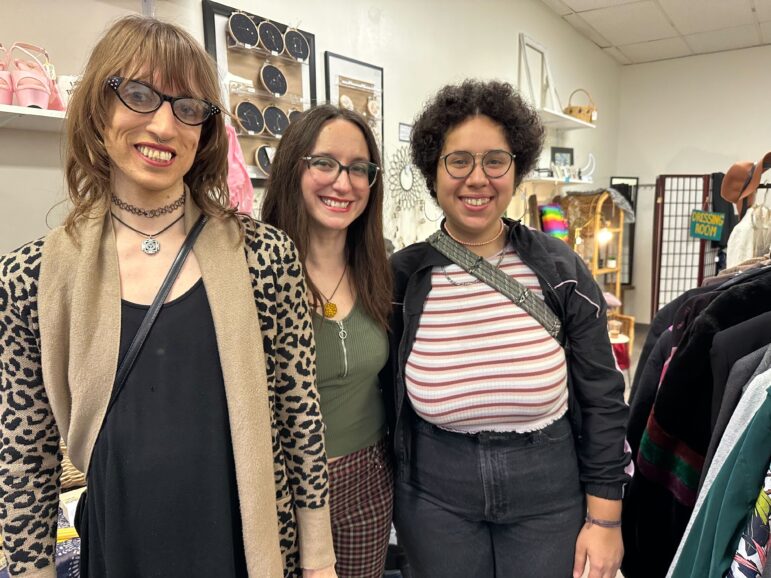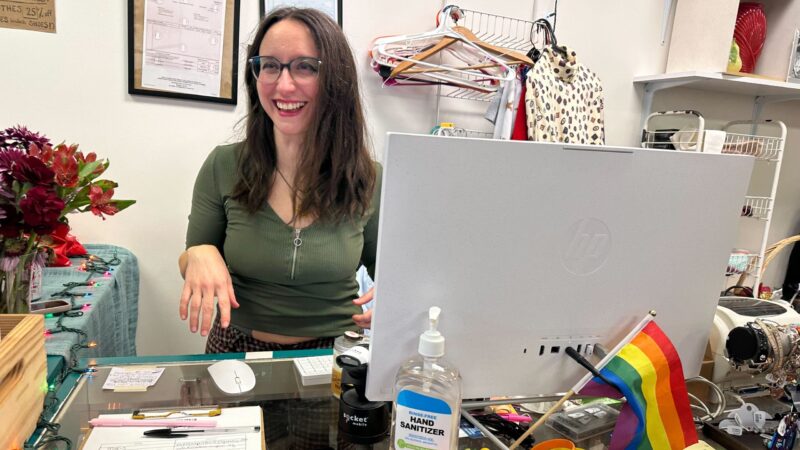This shop is bringing gender-fluid clothing to Birmingham
In 2013 Sarah Randolph had an idea: she would open a store in Birmingham that resembled the vintage and consignment shops she loved, but with a twist. The shop would be gender-neutral.
After seven years and major life changes, including a divorce and coming out as queer, Randolph’s dream came to fruition when she opened rEVOLVer Resale in Birmingham’s Five Points South neighborhood in September 2023.
All clothes at the shop are organized by size and style, but Randolph said she doesn’t separate items based on gender because “gender is just something that we create as a society.”
The store is one of the first of its kind in Birmingham, but gender-neutral clothing has been on the rise for years, reflecting a shift in consumer preferences and expression.
Gender-neutral clothing in culture

Famous artists – like Prince and David Bowie – have worn gender-fluid clothing for decades, without acknowledging it. But recently, the trend has attracted more media attention, with celebrities like Harry Styles stirring up discussion by wearing blouses and skirts.
To non-binary designer MI Leggett, increased recognition has brought positive attention to the gender-nonconforming community.
“We’re seeing a lot more trendsetters and influencers just sort of casually incorporating gender-neutral dressing into their content, into their outfits, into their lifestyle,” Leggett said.
According to fashion industry experts, Generation-Z is the largest consumer group worldwide, with a purchasing power of over $360 billion in the U.S. alone. They’re also experimenting the most with gender-fluid clothing.
“About 58% of the gender-fluid clothing is consumed by Gen-Zers, while millennials are about 40%,” said Sugandha Gupta, a professor at Parsons School of Design.
Gupta said with this trend on the rise, big brands are embracing gender-neutral styles. But in seeking to turn a profit, companies often produce clothes quickly and cheaply, without considering the needs of the consumer group. Gupta said this has led to collections without nuance manufactured in unethical conditions.
Environmental concerns
Leggett’s clothing line, “Official Rebrand,” combines queer liberation and environmental protection by repurposing discarded clothes and removing their previously gendered aspects – like Leggett’s non-binary button down shirt.

The buttons on men’s and women’s shirts go in different directions. Men’s buttons are on the right side, and women’s are on the left.
“So half the buttons go one way and half the buttons go the other way. And then the result is a much boxier fit,” Leggett said.
Leggett recycles Items that fashion companies throw away because they’re damaged.
“I feel like I’m actually kind of a waste management company, in addition to being a fashion brand,” they said.
Finding sustainable clothing choices is another big issue for Gen-Z shoppers. According to consulting firm First Insight, 62% of the generation’s consumers prefer to buy from sustainable brands and 73% are willing to pay more for sustainable items.
Gupta said there are a number of brands turning to practices of reusing materials when producing clothing, but until there are structural changes in our economy, brands will continue to be incentivized to make things as quickly as possible.
commUNITY

Randolph said she hopes her store will empower people to shop second-hand or support a local business, rather than support brands that engage in unethical practices.
She also wants rEVOLVEr resale to be a beacon for the Birmingham queer community, by being a safe space for individuals to freely express themselves.
“I don’t only want to be a store. It’s not just about money for me. I want to be a community resource for the community, by the community,” she said.
She wanted to make sure queer people know her shop is a place of refuge during this period of increased anti-LGBTQ legislation. She specifically cited Senate Bill 4, which would make it a misdemeanor to display an unapproved flag on public property.
In addition to the pride flags in the shop, she keeps a large pride flag in the window that welcomes customers into rEVOLVEr resale.
“It is just a symbol to anyone that even if you don’t realize, it’s a queer owned space, you might realize, ‘Oh, it’s queer friendly.’ I think that’s very important for visibility,” she said.
40 years after ‘Purple Rain,’ Prince’s band remembers how the movie came together
Before social media, the film Purple Rain gave audiences a peak into Prince’s musical life. Band members say the true genesis of the title song was much less combative than the version presented in the film.
Park Fire in California could continue growing exponentially, Cal Fire officer says
Cal Fire has confirmed that over a hundred structures have been damaged in the Park Fire, which grew overnight near Chico, Calif. Difficult firefighting conditions are forecast through Friday night.
Checking in with Black voters in Georgia about the election, now that Biden is out
Some voters who could be key to deciding who wins Georgia. What do they think about Vice President Harris becoming the frontrunner in the race to be the Democratic nominee?
Tahiti’s waves are a matter of ‘life and death’ for surfing Olympics
Tahiti's Teahupo'o wave has a slew of riders for the Paris 2024 Olympics. NPR finds out why it's called one of the most dangerous waves.
Researchers are revising botanical names to address troubling connotations
Since the mid-1700s, researchers have classified life with scientific names. But some of them have problematic histories and connotations. The botanical community is trying to tackle this issue.
A spectacular opening ceremony wowed a global audience despite Paris’ on-and-off rain
The Paris Olympics opening ceremony wowed Parisians, fans and most everyone who was able to catch a glimpse of thousands of athletes floating down the Seine to officially begin the Games.



